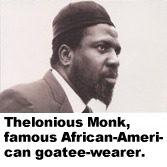


 Flannelgraph Jesus is not sure he has the “secret message” down yet.
Flannelgraph Jesus is not sure he has the “secret message” down yet.



 Flannelgraph Jesus is not sure he has the “secret message” down yet.
Flannelgraph Jesus is not sure he has the “secret message” down yet.
And then there was this:Dear Ish,
I find myself strangely attracted to the Emerging Church, despite the fact that I’m African-American. I was introduced to it by one of my fellow students here at M.I.T. and I find it quite stimulating. I’ve even skipped meetings of the campus chess club on more than one occasion just to be there.
Some of the cultural adjustments I’ve had to make to fit in with the EC have been challenging, however. For one thing, I’ve had to learn to avoid expressing my opinions in matters of aesthetic taste. Don’t get me wrong: Green Day’s music isn’t as bad as it sounds. But I’m not sure how much further I can stretch.
Lately I’ve been living under the shadow of a brooding cloud of angst. Do I have to wear a goatee to really belong in the EC? At first it seemed that only the leaders wore them. But on the last two Sundays I looked around and it seems like everyone's growing one (or trying to)! I’m not sure if I can take that step. What should I do?—Misgivings in Massachusetts
Yo, Ish!
Like I gots me dis problem, dig? First wuz dat I couldn’ fine none of deez e-merging places in ma hood, so I hads to jet somewheres else. Den, when I gets dare an’ starts kickin’ it its like—’sup wi’ all deez crackahs wearin’ mohawks on der chins an ever-thin? Like, I don’ mine all da candles, cuz I tries to keep da lights down in ma crib anyhow. An’ deez “eye-kons” o’ whatevah—it's like, if yo’ wanna get yo’ crayola thing on, dat’s cool. But dat south-pole fuzz dat blows around on a windy day—to me it jes looks wack. But den I’s wond’rin: is dat what da thugs in dis hood wear o’ what? Cuz like—I don’ wanna mess wit no body’s turf—uh-uh! I’s already gots me ’nuff problems with da stuff ’round ma own crib! You down wit’ dis?
—Tryin’ to Chill in Philly
 Believe it or not, I can strongly empathize with the plight you’re both enduring. The first time I saw a goatee on an emerging college sophomore a few years ago, I nearly shot a mouthful of Starbucks out my nose. You see, in my mind, goatees will forever be associated with the character of Maynard G. Krebs on an old TV show called “The Many Loves of Dobie Gillis,” which had been in re-runs for a few years by the time I was old enough to notice it. By that time (the mid-to-late ’60s) Jack Kerouac, beatniks, and the “beat generation” had been replaced by the Beatles, hippies, Yippies, and the SDS, as the youth culture’s new avant-garde—a term that isn’t used as much today as it was back then, but it’s fairly descriptive of how the Emerging Church thinks of itself.
Believe it or not, I can strongly empathize with the plight you’re both enduring. The first time I saw a goatee on an emerging college sophomore a few years ago, I nearly shot a mouthful of Starbucks out my nose. You see, in my mind, goatees will forever be associated with the character of Maynard G. Krebs on an old TV show called “The Many Loves of Dobie Gillis,” which had been in re-runs for a few years by the time I was old enough to notice it. By that time (the mid-to-late ’60s) Jack Kerouac, beatniks, and the “beat generation” had been replaced by the Beatles, hippies, Yippies, and the SDS, as the youth culture’s new avant-garde—a term that isn’t used as much today as it was back then, but it’s fairly descriptive of how the Emerging Church thinks of itself. Meanwhile, take heart. When’s the last time you saw some white guy do something new or start dressing funky and millions of black people suddenly tripped all over themselves trying to act or dress the same? (Why do you think all those white beatniks started wearing goatees in the first place?) If you two found a way to grow your eyebrows long and tie them in bows behind your heads, most of the white guys in your churches would be Googling for hair-growing chemicals within the next half-hour.
Meanwhile, take heart. When’s the last time you saw some white guy do something new or start dressing funky and millions of black people suddenly tripped all over themselves trying to act or dress the same? (Why do you think all those white beatniks started wearing goatees in the first place?) If you two found a way to grow your eyebrows long and tie them in bows behind your heads, most of the white guys in your churches would be Googling for hair-growing chemicals within the next half-hour.

[1] These are the generations of evangelicalism in the land of North America.
 [2] Now congregationalism begat Pilgrims who sailed from Leiden to Massachusetts and were soon joined by their brothers, the Puritans. [3] Pilgrims and Puritans begat theocracy, which in the days of Hutchinson, also called Anne, and Williams, also called Roger, begat discontent. [4] Discontent begat Baptists, and soon all manner of church polities and creeds prospered in the land, while prosperity itself begat spiritual apathy and slumber. [5] Then came a day of Great Awakening, which begat New Lights. [6] And thus did the Old Lights squint, and great was their outcry throughout the land, [7] but the sons of Edwards and the sons of the Wesleys and the sons of Whitefield did not heed their cries, [8] for they saw the mighty works that God wrought among them.
[2] Now congregationalism begat Pilgrims who sailed from Leiden to Massachusetts and were soon joined by their brothers, the Puritans. [3] Pilgrims and Puritans begat theocracy, which in the days of Hutchinson, also called Anne, and Williams, also called Roger, begat discontent. [4] Discontent begat Baptists, and soon all manner of church polities and creeds prospered in the land, while prosperity itself begat spiritual apathy and slumber. [5] Then came a day of Great Awakening, which begat New Lights. [6] And thus did the Old Lights squint, and great was their outcry throughout the land, [7] but the sons of Edwards and the sons of the Wesleys and the sons of Whitefield did not heed their cries, [8] for they saw the mighty works that God wrought among them. [9] Then the sons of men listened to the Paineites, who spoke of “Common Sense,” and “The Crisis,” and [some mss. read “later” here] “The Age of Reason,” and the kings of the earth took sides and waged war, and the Montesquieuites and Rousseauites rose up in the land, [10] and they said, “Let us be called the United States of America, where no king rules from New England to Florida, and west to the Mississippi!” [11] And so every man believed that which was right in his own eyes, and thus it was even after the warring ceased.
[12] In the turmoil of those days a great darkness fell upon the land, and men looked for light, both old and new, but could not find it. [13] The sons of Calvin and the sons of Arminius cried out, and behold, the land was soon filled with Taylorites and Finneyites who imagined that they created the light themselves. [14] But nevertheless the light spread, and a Second day of Great Awakening came, which begat revivalism, and revivalism begat manipulative evangelistic techniques, and manipulative evangelistic techniques begat many verses of “Just As I Am.”
[15] Now in those days, a son of Africa was counted as three-fifths of a person, and could be owned by a son of Europe in the region of Dixie. [16] And for two generations the Foxites and the Wesleyites stirred up many of their evangelical brethren to cease this abomination, crying, “Abolition! Abolition!” [17] But before the reign of Lincoln could commence, the cries went out from Dan, Virginia, to Beersheba, South Carolina: “Secession! Secession!” [18] And, lo, 600,000 men were slain on the field of battle before the rebellion was ended.
[19] Soon after, when every man had returned to his house, behold, Moody said to Sankey, “Let us sing great hyms to large crowds in spacious halls on both sides of the Atlantic!” [20] And thus revivalism, which had begotten manipulative evangelistic techniques, now also begat mass evangelism, [21] and mass evangelism begat interdenominational cooperation, [22] and interdenominational cooperation begat organizations, and agencies, and publishing houses, and Bible conferences.
[23] But while the sons of Darby gathered in Niagara, the sons of Schleirmacher said to the sons of Darwin, “Let us circumscribe the truth of Scripture according to the limits of our scientific presuppositions.” And it was so. [24] And when the sons of Luther, and the sons of Calvin, and the sons of Arminius, and of Wesley, and even of Moody and of Darby—when they heard of these things—each one said to the other, “If the foundations are being destroyed, what should the righteous do?” [25] And thus they took up pen and ink, and each man flew to his printing press, and each man contacted his colporteur, they did great battle against the sons of Schleirmacher and the sons of Darwin, and all who would come against them. [26] Now the rest of their acts, and all they did in defense of the propositional truth of Scripture, are they not written in the books of The Fundamentals?
CLOUSEAU: "Does your blog bite?" HOTEL CLERK: "No" CLOUSEAU: "Nice bloggy--" BLOG: Snarl! Chomp! CLOUSEAU: "I thought you said your blog did not bite!" HOTEL CLERK: "That is not my blog."